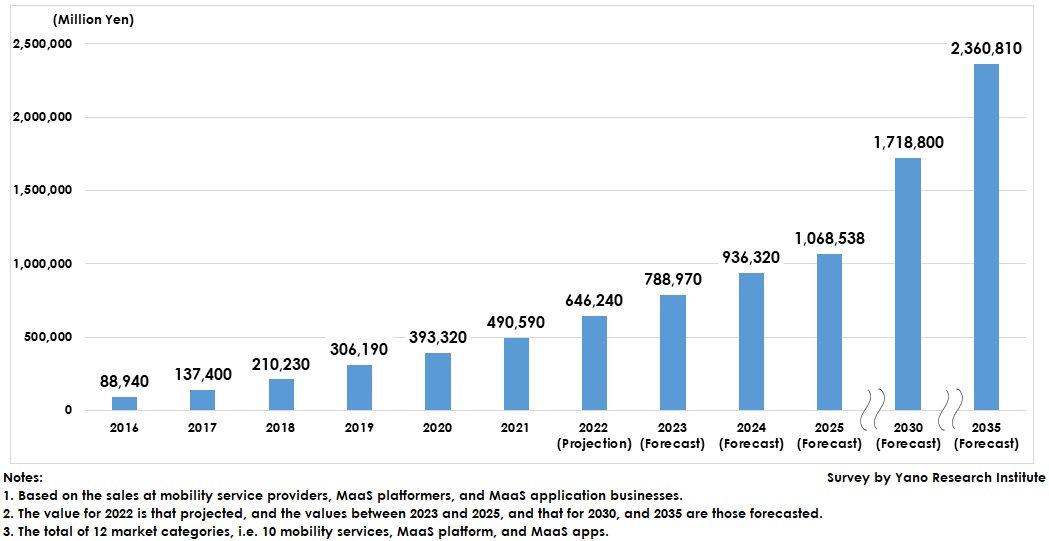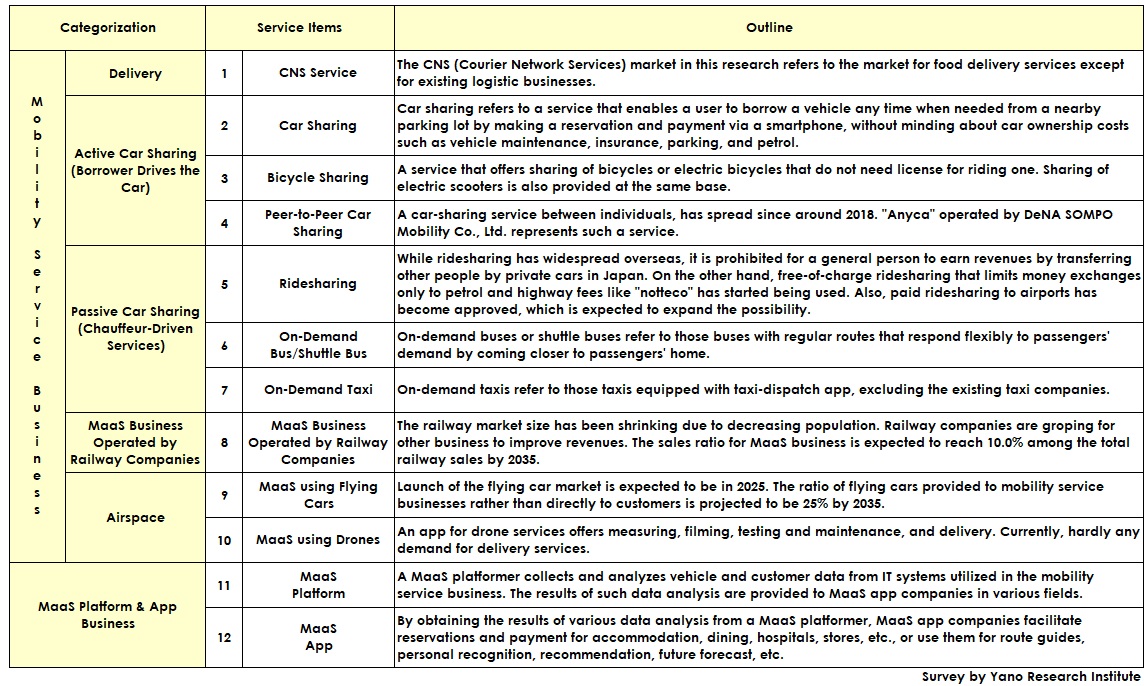No.3227
MaaS Market in Japan: Key Research Findings 2023
Domestic MaaS Market Size (Total of 12 Market Categories of Mobility Services including MaaS Platform & App Business) Projected to Reach 2,360,810 Million Yen by 2035
Yano Research Institute (the President, Takashi Mizukoshi) surveyed the domestic MaaS (Mobility as a Service) market, and found out the market trends by service, trends of utilizing MaaS data, trends of market players, and future perspectives.


Market Overview
MaaS (Motility as a Service) is a new concept of seeing the mobility, i.e., transferring a person from one place to another, as a single service linked seamlessly to all means of mobilities by the use of ICT, except for private cars, regardless of the operators being public, private or any operational bodies*.
The estimated MaaS market size for 2021, calculated by totaling twelve categories of mobility services including MaaS platforms and MaaS apps is 490,590 million yen. The market size is projected to reach 1,718,800 million yen by 2030 and 2,360,810 million yen by 2035. As many evaluated that MaaS business as “too costly and not profitable” or “cannot earn benefits from just the mobility services and subsidies”, the domestic service providers in the market have struggled to monetize their operations, and the forecast for the domestic MaaS market forecast to be unfavorable.
* Source: PRI Review Issue #71 (2019) by the Policy Research Institute for Land, Infrastructure, Transport and Tourism (PRILIT) in the Ministry of Land, Infrastructure, Transport and Tourism.
Noteworthy Topics
Reasons for MaaS Platformers Becoming Invincible
This research has concluded that MaaS platformers are likely to play the central role in the future MaaS market.
First, from the “business profitability” perspective, MaaS platformers can be the core in the market, because it will be able to keep all the information and money to be deposited, just like smartphone app download service providers. In addition, just like MaaS app providers, the expectation is there to those businesses that utilize MaaS data collected and analyzed by MaaS platformers, especially data services for transportation policies at local governments and public agencies.
Secondly, it can be the nucleus of the market also from the technical standpoint. In the future, when MaaS services are provided by autonomous cars, the operations must be done by those platformers at the core, as they can handle even to remote control functions. If those platformers develop their services that collect and analyze locational information on vehicles, the potential of MaaS expands furthermore.
“Payment or settlement” is also the factor. The seamless payment using MaaS brings about MaaS platformers to be the core of the market. Future international competition in the MaaS market will require the participation of domestic MaaS app providers and platformers.
MaaS app providers can be profitable for the first few years supplemented by subsidies, but later on, when apps become commoditized and lower in prices, they are said to become sluggish. Therefore, growth of MaaS platformers that provide collected and analyzed MaaS data is important.
Future Outlook
In order to support the public transportation, the local traveling and economy, to change the automobile industry into the mobility industry, and to revive the railway and aviation industry in Japan, where number of young people is declining in association with decreasing as well as aging population, and where population has been concentrated in metropolitan cities, and suffering from lack of drivers, there is no help but to expect the expansion of MaaS services and the domestic MaaS market.
This requires diverse MaaS services that utilize various data collected from mobility service providers, and the roles to assist older people to travel and shop freely and to grant the freedom for information and payment methods to inbound customers.
In addition, revisions of laws and lifting of regulations on mobility have eliminated the obstacles for providing the MaaS services, letting MaaS to be recognized as a necessity in the society. In fact, the necessity of MaaS is even clearer now, as it has become the core of urban development and regional revitalization projects.
On the other hand, however, the automobile industry centered on OEMs (automakers) cannot earn enough profits just by manufacturing and selling new cars. Car sales over the years have been declining, and the unit price for BEVs can also decrease. As a countermeasure, companies are needed to derive a benefit from offering paid software updating using OTA (Over the Air) after vehicle sales, and the services for BEV battery exchanging, reusing, and recycling. In particular, a BEV battery exchanging service, or BaaS (Battery as a Service) has been in the spotlight. It is the business model that allows the battery exchanges done at a battery swapping station where discharged battery packs are converted into charged ones, rather than users conventionally own batteries themselves. Although it is the battery service rather than the vehicle service, it still is new and is the most expected service.
Research Outline
2.Research Object: Domestic providers of mobility services (CNS [courier network service], car sharing, ridesharing, on-demand transportation service, railway businesses, drone service, etc.,) MaaS platformers, MaaS app providers, etc.
3.Research Methogology: Face-to-face interviews (online included) by specialized researchers, surveys via telephone and email, and literature research including searching and considering through our database
The MaaS (Mobility as a Service) Market
The MaaS market in this research refers to the twelve market categories, i.e., 10 mobility services, MaaS platform, and MaaS apps, with the market size calculated based on the sales at businesses concerned.
Mobility services include the lending of mobility tools such as four-wheel vehicles, two-wheel vehicles, or drones, or providing the chauffeur-driven services. MaaS platformers are the businesses that collect and analyze MaaS data acquired from mobility service providers and offer the results to MaaS app providers. MaaS app providers are those that buy MaaS data and the analytic results from MaaS platformers and create and provide the services based on them.
<Products and Services in the Market>
Mobility service business, MaaS platform business, MaaS app business
Published Report
Contact Us
The copyright and all other rights pertaining to this report belong to Yano Research Institute.
Please contact our PR team when quoting the report contents for the purpose other than media coverage.
Depending on the purpose of using our report, we may ask you to present your sentences for confirmation beforehand.